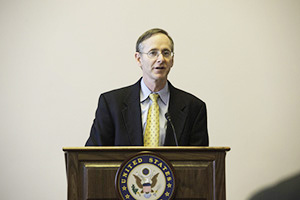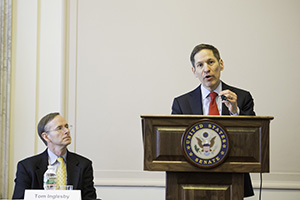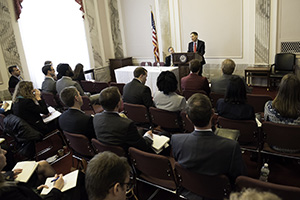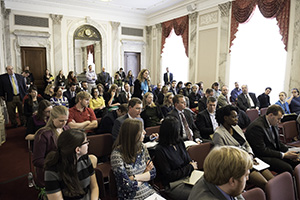
Hosted by: UPMC Center for Health Security
Tuesday, March 1, 2016
Russell Senate Office Building
Moderator
Dr. Tom Inglesby, Director, UPMC Center for Health Security
Speaker
Dr. Tom Frieden, Director, US Centers for Disease Control and Prevention, DHHS
On Tuesday, March 1st, the UPMC Center for Health Security hosted a Congressional Seminar on the ongoing Zika virus outbreak. The Seminar featured the Director of the Centers for Disease Control and Prevention (CDC), Dr. Tom Frieden. Dr. Frieden presented an update on the outbreak, what we know and do not know about the virus, and the steps that CDC is taking to respond. Dr. Frieden began by observing that “We are literally learning more about Zika every single day.”
Regarding CDC’s response, Dr. Frieden reported that a total of 600 staff members are currently working on Zika, in both their Atlanta headquarters and in various field deployments. Most of CDC’s work on another mosquito borne illness – dengue – has been put on hold, personnel with expertise in birth defects have been assigned to an emergency response for the first time, and the CDC’s emergency operations center is at a level 1 activation, which doesn’t happen often. They are also working to develop more and better diagnostic tests for Zika, including a forthcoming panel which will be able to differentiate Zika, dengue, and one other virus.
Dr. Frieden then described the state of the outbreak to date. First, he noted that it is unprecedented for a mosquito-borne virus to cause severe congenital malformations, which appears to be the case with Zika infection and microcephaly. In terms of geographic risk, any place that has had dengue transmission is at risk for Zika, as they share a common mosquito vector, Aedes aegypti. Dr. Frieden characterized A. aegypti as “the cockroach of mosquitos”, owing to its hardiness, resistance to many insecticides, and ability to bite humans silently and not elicit a painful stimuli.
Dr. Frieden then reviewed the four patterns of spread that we’ve seen or can expect to see. First, given the expanded availability of diagnostic tests, infected returning travelers have been identified in the US. Second, sexual transmission has been noted in cases where symptomatic men passed the virus to women through unprotected intercourse. Third, we can expect to see limited clusters of cases in the US, much like the limited outbreaks of dengue in Florida, Texas and Hawaii. Importantly, Dr. Frieden suggested that the presence of air conditioning and window screens appears to be protective. Finally, widespread transmission is possible, as witnessed by the experience in Latin America and the Caribbean, but that it is unlikely to occur in the US.
Dr. Frieden reiterated the CDC’s prevention advice, which is that, if you are a pregnant woman, you should not travel to affected areas. If you are there, take steps to prevent mosquito bites, and be aware of the possibility for sexual transmission of the virus. Dr. Frieden expressed particular concern for pregnant women in Puerto Rico, as they are at very high risk, and the possibility exists that, in the coming months, thousands of pregnant women could be exposed to the virus. He added that the costs are not just health-related, as the lifetime cost of caring for a child with a birth defect ranges from $1-10 million.
Dr. Frieden then underlined the importance of the President’s recent $1.9 billion supplemental funding request to Congress to combat Zika, $828 million of which would support the CDC’s response. High on the CDC’s priority list is protecting pregnant women, gaining a better understanding of which mosquito control methods are effective, improving domestic preparedness, and responding internationally. It has been suggested that, instead of an additional bolus of funding for Zika, that uncommitted funds from the Ebola response could be reprogrammed to support the governmental response to Zika. Dr. Frieden took a dim view of this approach, and stressed that since the response to Ebola is ongoing, it would be dangerous to let our guard down at this point. Dr. Frieden closed by observing that the lessons of Ebola and Zika are clear: that every country needs robust surveillance and disease control capabilities, and that the Global Health Security Agenda has been making progress to that end.

Dr. Thomas Inglesby: Opening Remarks

Speaker: Dr Tom Frieden

Seminar Attendees

Seminar Attendees